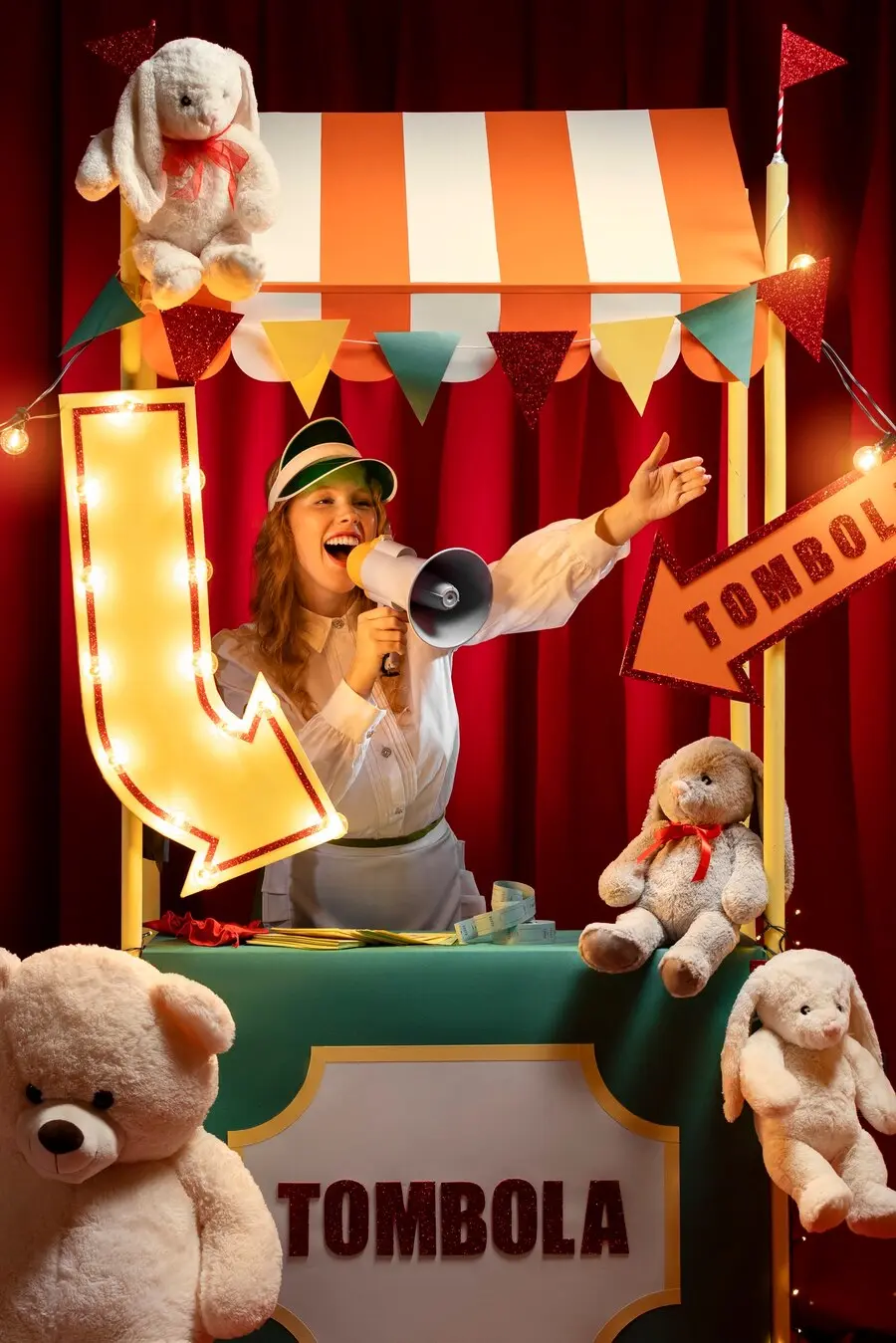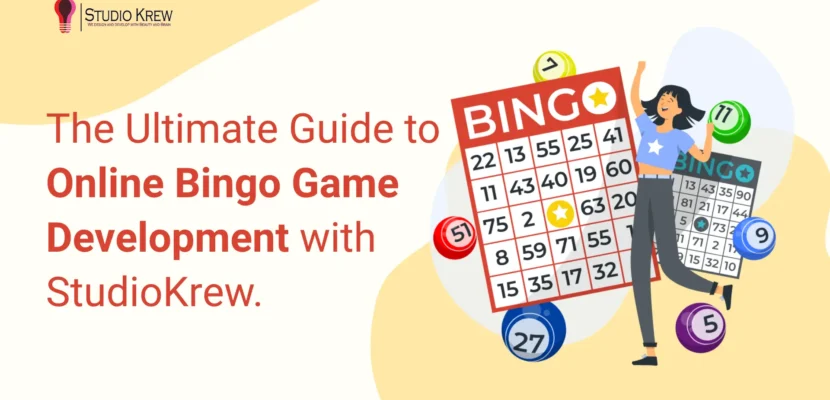Introduction
Bingo, also known as Housie, Tombola or Lotto, has captivated players for generations with its simple yet engaging gameplay. Originating in the 16th century, Bingo has evolved from traditional halls to vibrant online platforms, attracting a diverse audience worldwide. The charm of Bingo lies in its accessibility and social nature, making it a favourite pastime for many.
The digital age has witnessed a significant surge in the online Bingo game industry. The market for online Bingo games is thriving, with an estimated global market size of over $2 billion and projected annual growth of 8.3% from 2021 to 2027. This surge is driven by increasing smartphone penetration, improved internet connectivity, and the growing popularity of online gambling. The demand for innovative and interactive Bingo games, also known as Housie or Tambola games, is at an all-time high, presenting a golden opportunity for developers to tap into this expanding market. Players are seeking innovative and interactive gaming experiences, and Bingo perfectly fits this demand with its blend of excitement and community engagement.
As a leading game development company, StudioKrew specializes in creating immersive and engaging Bingo games that cater to various platforms, including mobile, web, and PC. This guide provides a comprehensive overview of the Bingo game development process. From understanding the game’s intricacies to exploring market statistics and effective planning, we will walk you through every crucial aspect. Additionally, we will delve into the development phase, share strategies to ensure your game’s success, and offer valuable tips to consider for creating a standout online Bingo game.
Whether you are a seasoned developer or a newcomer to the gaming industry, this guide will equip you with the knowledge and insights needed to bring your Bingo game vision to life. Let’s embark on this exciting journey with StudioKrew and explore the world of online Bingo game development.
Understanding Bingo Game
Bingo, with its roots deeply embedded in the fabric of gaming culture, continues to captivate a broad audience with its simplicity and excitement. As the game has transitioned from traditional halls to online platforms, its variations have expanded, catering to different player preferences and reward modes.
Before we start, let’s discuss how the Bingo game works. Each game consists of a Room, a Caller or Host, Participants, Numbers, and Tickets.
- Room: This is a closed session where all the participants gather and compete with each other. Each participant receives a unique ticket, which may or may not be chargeable.
- Caller: When the game starts, numbers will be called at regular intervals. These numbers are drawn using an RNG (Random Number Generator) algorithm to ensure they are not predictable.
- Participants: Each registered user in the room is called a Participant. They are usually given a ticket and will play in the session by marking the numbers on their ticket as the caller calls them.
- Numbers: Each round of the game in a room consists of numbers ranging from 1 to a specific upper limit, such as 30, 75, 80, or 90. In the real world, these numbers are represented by balls drawn by the caller.
- Ticket: Each participant is allocated a unique ticket upon joining the room. This ticket contains random numbers, and the participants must mark off the called numbers according to the game rules to win.
Common winning points include:
- Full House: The first player to strike all the numbers on their ticket wins.
- Early 5: The first player to strike five numbers in any row wins, which is ideal for shorter games.
- First Row: The first player to strike all numbers along the top row wins.
- Corners: The first player to strike the four corner numbers of the ticket wins.
- Low, Mid, or High: Each ticket has 3, 4, or 6 columns. Columns are equally distributed into three sections, and from the left, the first section is considered low, the second is mid, and the last is high. The first player to strike that respective section of the ticket wins.
Feel free to create your winning point or explore various ideas online or from other Bingo games or players.
Types of Bingo Games
Bingo games can be categorized based on the reward mode and game type. Here’s a breakdown to help you understand the different forms of Bingo:
By Reward Mode:
- Casual Bingo: Typically found in social gaming apps and platforms, these games focus purely on entertainment without any user money investment. They are short game sessions with advertisement and in-app purchases enabled.
- Virtual Money Bingo Games: These games use in-game currency or virtual tokens instead of real money. They are popular for their low-risk, fun-oriented gameplay. In these types of games, gradually, user interest was gained, increasing the chances of buying these tokens through InApp purchases.
- Real Money Bingo Games: These games involve wagering real money and offer cash prizes, appealing to players seeking thrill and financial reward. These games are primarily developed with massive multiplayer game mechanics in mind, which allow a large pool of users to play in the same room.
By Game Type:
- 90-Ball Bingo: Also famous by the name Tambola or Housie, this version is common in India, Pakistan, UK, and Australia, played on a 9×3 grid, aiming for one line, two lines, or a full house.
- 80-Ball Bingo: A 4×4 grid game with quicker gameplay and unique patterns.
- 75-Ball Bingo: Popular in North America, played on a 5×5 grid with a free centre space.
- 30-Ball Bingo: Known as “Speed Bingo,” it uses a 3×3 grid, ideal for fast-paced play.
- Themed Bingo Games: These incorporate specific themes, enhancing engagement through familiar and exciting content.
Market Statistics
The Bingo market is thriving, driven by the increasing popularity of online gaming and the shift towards mobile platforms. Here are some key statistics highlighting the current state of the market:
- The global online Bingo market is projected to grow at a compound annual growth rate (CAGR) of 11.5% over the next five years.
- Mobile Bingo games are experiencing significant growth, with a large portion of players preferring to play on their smartphones and tablets.
- The demand for real-money Bingo games is rising, with players seeking thrilling and rewarding experiences.
- Social Bingo games, which integrate social media features and community-building aspects, are gaining traction among players.
These trends indicate a robust market with ample opportunities for innovative and engaging Bingo games.
Audience and Demographics
Understanding your target audience is crucial for developing a successful Bingo game. The typical Bingo player demographic includes:
- Age Range: While traditionally associated with older adults, Bingo has seen a resurgence among younger players, particularly those aged 25-45.
- Gender: Bingo attracts a balanced mix of male and female players, with a slight skew towards female players in some regions.
- Location: Bingo is popular worldwide, with strong followings in North America, India, the UK, Australia, and parts of Europe.
- Device Preferences: A significant portion of players prefer mobile devices (60%), followed by tablets (25%) and PCs (15%).
- Player Preferences: Modern Bingo players seek interactive and engaging experiences, and they prefer mobile-friendly games, social features, and real-money gameplay options.
By understanding these demographics, developers can tailor their Bingo games to meet the preferences and expectations of their target audience, ensuring a more engaging and successful gaming experience.
The Online Bingo Game development process is commonly divided into four phases: Planning, Production and Development, Testing, and Launch and marketing.
Planning Phase
The planning phase is a critical step in developing an online Bingo game. It sets the foundation for the entire project, ensuring every aspect of the game is meticulously thought out and strategically aligned with market demands and player preferences. Here’s a detailed look at the key components of the planning phase:
Market Research
Market research is the first step in the planning phase. This involves analyzing current trends in the Bingo market, understanding player behaviour, and identifying opportunities for innovation. Key areas to focus on include:
- Market Size and Growth: Determine the current size of the online Bingo market and its projected growth rate. This will help you set realistic targets for your game’s user base and revenue.
- Competitor Analysis: Study existing online Bingo games to understand what features are popular and how players respond to them. Identify gaps in the market that your game can fill, whether it’s through unique features, better user experience, or innovative monetization strategies.
- Player Preferences: Conduct surveys or analyze player feedback from existing games to uncover what players enjoy and what they find lacking. These insights can guide game mechanics, social features, and overall design decisions.
Scope Assessment
Defining the scope of your Bingo game is crucial to ensure that the project stays on track and within budget. This involves:
- Feature List: Create a detailed list of features your Bingo game will include. This may encompass various Bingo variations (e.g., 75-ball, 90-ball), multiplayer functionality, chat systems, reward structures (such as levels or achievements), and integration with social media platforms.
- Platform Selection: Decide where your game will be available — mobile devices (iOS, Android), web browsers, and desktop applications. Each platform may have specific technical requirements and user interface considerations. Cross-platform game development might be a good choice if you’re aiming for multiple options. For further details, please visit our Cross-platform game development company web page.
- Technical Requirements: Outline the necessary technical infrastructure to support your game. This includes server specifications (such as cloud hosting options), database management (for storing player data and game progress), and security measures (to protect user information and financial transactions).
Concept Development
Concept development is where the creative aspects of the game come to life. This includes:
- Game Mechanics: Specify how the game will operate, including rules for calling numbers, winning conditions (like full house or pattern matches), and special features (such as power-ups or mini-games). The mechanics should be intuitive yet engaging, catering to casual and seasoned players.
- User Experience (UX): Design the user journey to ensure seamless navigation and enjoyable gameplay. Consider factors like user interface design, First-Time User Experience (FTUE), setting features for font, music, SFX, FPS, and more, and interactive elements that enhance immersion and retention.
Target Audience
Understanding your target audience is crucial for developing a game that resonates with players, especially when planning for online game development. Consider the following:
- Demographics: Define the demographics of your target players, including age groups, gender distribution, geographic location, and socio-economic background. This information helps craft game content and promotional strategies that resonate with your audience.
- Device Preferences: Analyze the percentage of players accessing similar games on mobile devices, tablets, and desktops. This data informs decisions on platform optimization and feature prioritization.
- Player Motivations: Identify what drives players to engage with Bingo games — whether it’s social interaction, competitive gameplay, relaxation, or the potential for real money rewards. Tailor your game’s features and marketing messages to address these motivations effectively. For more details, please refer to our Real-Money Game development services page for additional information.
Monetization Strategy
A well-thought-out monetization strategy is essential for the game’s financial success. Options include:
- In-App Purchases: Offer players the option to purchase virtual goods, extra Bingo tickets, special power-ups, or cosmetic enhancements (such as themed daubers or avatar accessories).
- Advertisements: Integrate non-intrusive ads within the game to generate revenue. Opt for strategic placements that do not disrupt gameplay flow, such as between rounds or as optional video rewards.
- Subscription Models: Consider offering premium memberships or VIP tiers that provide exclusive benefits, such as ad-free gameplay, access to private rooms with higher stakes, or faster progression through levels.
Game Theme
The theme of your Bingo game sets the tone and enhances the player experience. Consider the following:
- Visual Style: Choose a visual aesthetic that aligns with your target audience’s preferences and expectations. Options range from classic Bingo hall designs to modern, themed environments inspired by popular culture, holidays, or seasonal motifs.
- Sound Design: Develop a cohesive soundscape that complements the game’s theme and enhances immersion. This includes background music, sound effects for number calls and daubing, and optional settings for audio preferences.
- Themed Rooms: Create diverse Bingo rooms that reflect different themes or settings. Each room may feature unique visuals, soundtracks, and interactive elements, keeping gameplay fresh and appealing to a broad audience.
Art Bible Production
An art bible is a comprehensive document that outlines the game’s visual direction. It includes:
- Character Designs: If applicable, define character concepts and visual styles for avatars or mascots featured in the game. Consider how these characters interact with players and contribute to the game experience.
- Environment Art: Conceptualize the game’s environments, including Bingo halls, themed rooms, user interfaces, and interactive elements. Define colour palettes, architectural styles, and atmospheric details to evoke the desired mood or ambience.
- Typography: Select appropriate fonts for in-game text, ensuring readability across different screen sizes and resolutions. Typography choices should enhance the game’s visual appeal while maintaining accessibility for all players.
By thoroughly planning each of these aspects, you lay a strong foundation for the development phase, ensuring that the game meets and exceeds player expectations. StudioKrew’s expertise in game development services ensures that each phase is executed with precision, creativity, and a focus on delivering an exceptional gaming experience.
Production or Development Phase
The production or development phase is where the planning transforms into reality. This phase involves the actual creation of the game, from coding to design implementation. Here’s a comprehensive overview of what this phase entails:
1. Prototyping
Prototyping is the first step in the development phase and is a crucial process for testing and refining ideas before full-scale production begins.
- Wireframes and Mockups: Create wireframes and mockups to visualize the game’s layout and user interface. This helps identify potential design issues early on.
- Functional Prototypes: Develop functional prototypes to test the core mechanics and gameplay. This allows for iterative testing and feedback, ensuring the game mechanics are engaging and intuitive.
2. Game Design and Development
This stage involves the actual coding and development of the game, turning the concepts and prototypes into a playable product.
- Front-End Development: Focus on the client-side aspects of the game, including the user interface, animations, and user interactions. Technologies like HTML5, CSS3, and JavaScript are often used for web-based games, while mobile games may be developed using platforms like Unity or Unreal Engine.
- Back-End Development: Implement the server-side logic, databases, and APIs needed to support the game’sgame’s functionality. This includes player authentication, game state management, and real-time data handling.
- Game Logic: Develop the algorithms and logic that govern the game mechanics, such as number calling, win condition checks, and reward distribution.
- Multiplayer Integration: Implement features that allow players to compete against each other in real time. This includes developing robust networking code for multiplayer sessions, leaderboards, and chat systems. For more information, check our Massive Multiplayer Game Development Services.

3. Graphic and Audio Design
Creating an engaging visual and auditory experience is essential for player immersion and enjoyment.
- Graphic Design: Develop high-quality graphics, including game backgrounds, Bingo cards, UI elements, and animations. Ensure that the visual style aligns with the game’sgame’s theme and enhances the overall player experience.
- Audio Design: Create sound effects and background music that complement the game’sgame’s theme. This includes sounds for number calls, daubing, winning, and other in-game actions. Consider hiring professional voice actors for number calls and other voiceovers to add a polished touch.
4. Testing and Quality Assurance (QA)
Testing is a critical step to ensure that the game is bug-free, stable, and enjoyable.
- Alpha Testing: Conduct internal testing to identify and fix major bugs and issues. This phase involves developers and QA testers rigorously playing the game to ensure all features work as intended.
- Beta Testing: Release a beta version of the game to a select group of external players. This provides valuable feedback on gameplay, user experience, and potential bugs missed during alpha testing.
- Performance Testing: Test the game’s performance across different devices and platforms to ensure smooth gameplay. Optimize the game to run efficiently on various hardware configurations.
- Usability Testing: Assess the game’s usability and user interface design. Gather feedback from players to refine the user experience and make necessary adjustments.
5. Final Adjustments and Polishing
Before launching the game, final adjustments and polishing are crucial to ensure a high-quality product.
- Bug Fixing: Address any remaining bugs and issues identified during the testing phases.
- Optimization: Optimize the game’sgame’s code and assets for performance and load times. This includes compressing images, optimizing sound files, and fine-tuning algorithms.
- Final Enhancements: Add final touches to enhance the player experience, such as special effects, additional animations, and final UI tweaks.
6. Deployment and Launch
Deploying the game involves preparing it for release on the chosen platforms and launching it publicly.
- Platform Preparation: Prepare the game for deployment on various platforms, such as app stores (Google Play, Apple App Store), web browsers, or PC distribution services (Steam, Epic Games Store).
- Marketing and Promotion: Develop a marketing strategy to promote the game’sgame’s launch. This includes creating promotional materials, engaging with gaming communities, and leveraging social media and influencers.
- Release: Launch the game to the public. Monitor the launch closely to address any immediate issues or feedback from players.
- Post-Launch Support: Provide ongoing support and updates to keep the game fresh and engaging. Address post-launch bugs, add new content, and engage with the player community to build a loyal user base. Check our Game Live-ops services page to learn more about Liveops and how it works, or read our detailed blog post on Liveops below. Read Now

By following these detailed steps in the production or development phase, StudioKrew ensures that every aspect of the Bingo game is meticulously crafted, tested, and optimized for a superior player experience. This approach guarantees a high-quality game and sets the stage for its success in the competitive online gaming market.
Launch and Marketing: Making Your Bingo Game Successful
Creating a Bingo game is just the first step; ensuring its success in a competitive market is an ongoing process. This section delves into the key strategies that can elevate your Bingo game from merely good to truly great. By focusing on strategic marketing, player engagement, effective monetization, community building, and continuous improvement, you can maximize both player satisfaction and revenue. Here’s what you can expect as we explore these crucial aspects in detail.

1. Strategic Marketing and Promotion
Effective marketing and promotion strategies are essential to ensure your Bingo game reaches its target audience and generates initial traction:
- Pre-Launch Campaigns: Build anticipation and awareness before the game’sgame’s release. This can include teaser trailers, sneak peeks of gameplay, and countdowns on social media platforms. Engage with potential players early to create buzz and excitement.
- Influencer Partnerships: Collaborate with gaming influencers and content creators with a strong following within your game’s target demographic. Influencers can provide authentic reviews, gameplay showcases, and endorsements that resonate with their audience and drive downloads.
- App Store Optimization (ASO): Optimize your game’s visibility on app stores using relevant keywords, compelling descriptions, and high-quality visuals. ASO helps improve your game’sgame’s discoverability and increases organic downloads.
- Cross-Promotion: Promote your new bingo game by utilizing existing player bases from other games or apps within your portfolio. Cross-promotion can significantly expand your reach and attract players who are already engaged with similar games.
- Social Media Engagement: Maintain active and consistent engagement on social media platforms such as Facebook, Twitter, Instagram, and TikTok. Share updates, respond to player inquiries and feedback, and run interactive campaigns (like polls or challenges) to build a community around your game.
2. Player Engagement and Retention
Retaining players and keeping them engaged is critical for long-term success and monetization opportunities:
- Daily Rewards and Bonuses: Encourage daily engagement by offering a Daily Active User’s reward trail. These can include in-game currency, power-ups, or exclusive items that enhance gameplay.
- Social Features: Implement features like chat rooms, friend lists, and clubs. Social interactions foster a sense of community among players, leading to longer retention and increased player satisfaction.
- Regular Updates and New Content: Regular updates introducing new features, game modes, themes, and seasonal content keep the game fresh and exciting. Players are more likely to continue playing when there’s always something new to discover.
- Player Feedback Loop: Actively solicit and listen to player feedback through surveys, in-game feedback forms, and community forums. Use this feedback to prioritize updates and improvements that align with player expectations and preferences.
3. Monetization and Revenue Optimization
Although you can monetize your online bingo game by selling tickets or introducing participation fees for exclusive rooms, maximizing revenue while providing value to players through thoughtful monetization strategies is always advisable. Some of the examples are:
- Balanced In-App Purchases: Offer a range of in-app purchases catering to player preferences and spending behaviours. Some feature references are exclusive avatar images, emoticons, player-level ranking, and exclusive Member-only bingo game tournaments.
- In-App Advertisement: Integrate advertisements strategically, such as rewarded video ads or opt-in interstitials, that provide value to players in exchange for rewards. Balance ad frequency and placement to minimize disruption to gameplay while maximizing revenue potential.
- Subscription Models: Introduce subscription tiers that offer premium benefits such as ad-free gameplay, exclusive content, faster progression, and special discounts on in-game purchases. Subscriptions provide a predictable revenue stream and foster player loyalty.
- Special Events and Promotions: Organize limited-time events, seasonal promotions, and sales that incentivize spending and increase player engagement. These events create urgency and excitement among players, driving monetization opportunities.
4. Building a Community
Nurture a strong and supportive player community to enhance player retention, advocacy, and long-term game success:
- Community Management: Employ dedicated community managers to interact with players, address inquiries and concerns, and foster a positive community environment. Active community management builds trust and strengthens player loyalty.
- Player Events and Tournaments: Organize regular events, tournaments, and competitions with enticing rewards and recognition for top performers. These activities promote friendly competition, boost player engagement, and encourage continued participation.
- Content Creation and Sharing: Encourage players to create and share user-generated content related to the game, such as fan art, gameplay videos, tutorials, and strategy guides. Highlight and reward top contributors to foster a sense of community ownership and creativity.
5. Continuous Improvement and Support
Ensure ongoing success by continuously improving the game based on player feedback and market trends:
- Regular Updates: Release frequent updates that address player feedback, introduce new features, optimize performance, and fix bugs. Regular updates demonstrate commitment to the game’sgame’s improvement and longevity.
- Customer Support: Provide responsive and effective customer support to promptly address player inquiries, technical issues, and feedback. Excellent customer service enhances player satisfaction and loyalty.
- Data Analytics: Utilize data analytics tools to monitor player behaviour, engagement metrics, and revenue performance. Analyze this data to identify trends, patterns, and opportunities for optimization and enhancement.
- A/B Testing: Conduct A/B testing for different game features, user interfaces, and monetization strategies to determine what resonates best with players. Use data-driven insights to iterate and improve the game’sgame’s overall performance and player experience.
By implementing these comprehensive strategies, StudioKrew ensures that your Bingo game attracts a large player base and retains them through engaging content, strategic monetization, community building, and continuous improvement. This approach maximizes player satisfaction and retention and positions your game for long-term success in the competitive online gaming market.

Types of Bingo Games Developed by StudioKrew
At StudioKrew, we specialize in crafting a diverse range of Bingo games tailored to various device types targeting player preferences and market demands. Our expertise spans classic game formats to innovative variations and rules, ensuring engaging experiences for all genres. Here’s a detailed overview of the types of Bingo games StudioKrew holds expertise in:
1. Classic Bingo Games Development
Classic Bingo games retain the traditional essence of Bingo, making them perfect for players who enjoy the game’s nostalgic feel. These games adhere to the standard Bingo rules with familiar variants like Tambola, Housie, Classic Bingo, and more. Our classic Bingo games are designed to replicate the excitement and community feel of physical Bingo halls, adapted seamlessly to digital platforms. For more information, check our Bingo game development company page.
Key Features:
- Traditional 75-ball or 90-ball Bingo formats
- Simple, easy-to-understand rules
- Classic Bingo caller voices and number nicknames
- Suitable for both beginners and seasoned players
Examples:
- Indian famous Tambola
- UK-Style 90-Ball Bingo
2. Bingo Games with Custom Rules & Mechanics
For players seeking a unique twist on the classic game, our custom Bingo games introduce innovative rules and mechanics. These games are designed to offer fresh and exciting gameplay experiences. Introducing innovative mechanics keeps the gameplay fresh and exciting, catering to players seeking a novel Bingo experience. For more information, check our Online Bingo Game development company page.
Key Features:
- Customizable game rules and win conditions
- Special power-ups and boosters
- Custom game animations and SFX
- Adaptable to player feedback and preferences
Examples:
- Bingo with power-ups like double daubs or extra balls
- Taubola
3. Casual Bingo Games Development
Casual Bingo games are designed for relaxed, leisurely play. These games often feature fun, light-hearted themes and mechanics that cater to a broad audience, including those who play Bingo to unwind and enjoy casual gaming. Casual Bingo games often include social features, such as chat options and friend invites, fostering a community atmosphere. They are perfect for players who enjoy playing Bingo in a light-hearted, stress-free environment, solo or with friends. Check out our Casual Game development company page for more information.
Key Features:
- Easy-to-learn mechanics with low stakes
- Light-hearted and colourful themes
- Shorter game sessions are ideal for casual play
- Social features like chat and friend invites
Examples:
- Beach Party Bingo
- Farm Frenzy Bingo
4. Real Money Bingo Games Development
For players interested in the thrill of wagering, we develop Real Money Bingo games. These games allow players to buy in with real money and compete for cash prizes. Our real money Bingo games adhere to strict regulations and security standards to ensure a safe and fair gaming environment. They feature secure payment gateways, robust anti-fraud measures, and transparent prize distribution systems. Real Money Bingo games appeal to competitive players who enjoy the added excitement of playing for real-world stakes. These games require careful design and compliance with gaming regulations to ensure fair play and secure transactions.
Key Features:
- Secure payment and withdrawal options
- Fair and transparent game mechanics
- Compliance with regional gambling laws
- Enhanced security measures to protect player data
Examples:
- Online Bingo tournaments with cash prizes
- Progressive jackpot Bingo games
5. Bingo Games for Campaigns and Events
Campaign-specific Bingo games are tailored for promotional events, marketing campaigns, or special occasions. These games can be customized to fit a particular theme or branding, making them ideal for corporate events, product launches, or seasonal celebrations. Campaign Bingo games often feature unique themes, branded content, and special prizes to enhance the promotional impact. They are an excellent tool for engaging audiences, increasing brand awareness, and creating memorable experiences. Check out our Campaign Game Development services company page.
Key Features:
- Custom themes aligning with campaign goals
- Integration with marketing and promotional activities
- Reward systems tied to campaign objectives
- Interactive and engaging game mechanics
Examples:
- Holiday-themed Bingo games for seasonal promotions
- KrewGames Tambola – Hosted for the Corporate event to engage family and friends at a single table.
6. Massive Multiplayer Bingo Games Development
Massive Multiplayer Bingo games are designed to support large-scale, online multiplayer experiences. These games can host thousands of players simultaneously, creating a dynamic and competitive environment. Features like leaderboards, tournaments, and live events add layers of competition and social interaction. Massive Multiplayer Bingo games are perfect for fostering community engagement and are often integrated with social media platforms for broader reach and connectivity. Check out our Massive Multiplayer game development company page.
Key Features:
- Real-time multiplayer gameplay with thousands of players
- Dynamic chat and social interaction features
- Regularly updated content and events to keep the community engaged
- Advanced matchmaking and leaderboards
Examples:
- MMO Bingo with live-hosted events
- Guild-based Bingo games with team competitions
7. Cross-Platform Bingo Games Development
Cross-platform Bingo game development service aims to offer a smooth gaming experience across different devices, such as mobile, tablet, browser, and desktop PC. This flexibility ensures that players can enjoy the game on their preferred device and allows users using different devices to compete in the same lobby. To learn more about cross-platform game development services, check out our page.
Key Features:
- Unified player accounts are accessible on all devices
- Consistent gameplay experience across platforms
- Synchronization of progress and in-game purchases
- Optimal performance and graphics on various screen sizes
Examples:
- Multi-device Bingo games with cloud save features
- Cross-platform multiplayer Bingo tournaments
Demographics and Device Preferences
Understanding Bingo players’ demographic preferences and device usage is crucial for targeting the right audience and optimizing the gaming experience. Here’s a breakdown:
- Mobile Devices: 65% of Bingo players prefer mobile devices for convenience and portability. Mobile apps ensure players can enjoy the game on the go.
- PC/Laptops: 25% of players enjoy the larger screen and more immersive experience provided by PCs and laptops.
- Tablets: 10% of players use tablets, balancing the portability of mobile devices with a larger screen for better visibility.
By leveraging these insights, StudioKrew ensures that each Bingo game we develop is optimized for the most popular devices, providing a seamless and enjoyable gaming experience across all platforms.
StudioKrew’s diverse range of Bingo games ensures that there is something for every player, whether you are looking for a classic experience, innovative gameplay, or the excitement of real money rewards. Our expertise in game development, combined with our deep understanding of player preferences, allows us to create Bingo games that are engaging, fun, and highly successful.
Conclusion
Developing a successful online Bingo game involves a blend of creativity, technical expertise, and strategic planning. From understanding the core mechanics of Bingo to creating engaging game types, StudioKrew has the experience and capability to bring your Bingo game vision to life. Our comprehensive approach encompasses market research, meticulous planning, and innovative development, ensuring that each game meets and exceeds player expectations.
At StudioKrew, we believe in crafting games that entertain, build communities, and create lasting impressions. Our diverse portfolio, including classic Bingo games, customized rule variations, and immersive MMO experiences, showcases our ability to cater to a wide range of audiences. We also prioritize monetization and player retention strategies, ensuring that your game is financially rewarding and beloved by players.
Partner with StudioKrew
Are you ready to turn your Bingo game idea into reality? Partner with StudioKrew, a leading game development company specializing in online Bingo games and beyond. Our team of experts is here to guide you through every step of the development process, from concept to launch and beyond. Whether you’re looking to create a casual game, a real money Bingo platform, an expansive multiplayer experience, or looking to hire the team of best game developers, we have the skills and expertise to make it happen.

Let’s build the next big thing in online Bingo together. Contact us today to discuss your project and explore how we can help you achieve your gaming goals. Visit our website, check out our portfolio, and read more about our successful projects. By choosing StudioKrew, you’re choosing a partner committed to excellence, innovation, and success in the gaming industry.
Get in touch with StudioKrew now, and let’s create something amazing!





